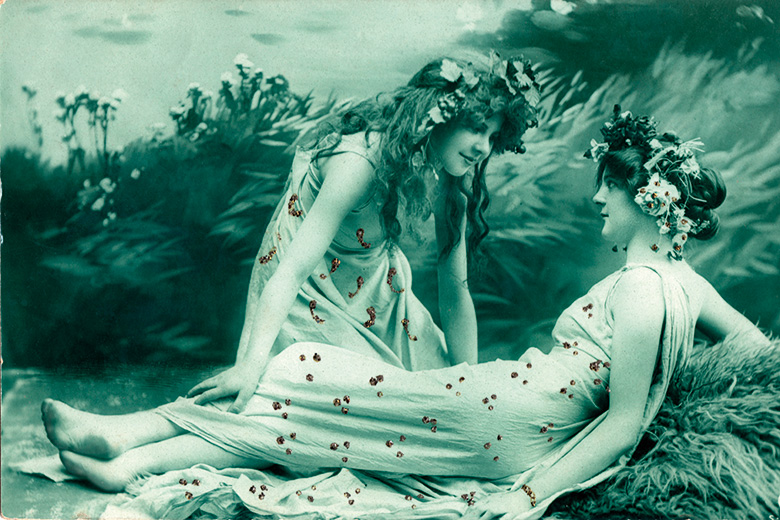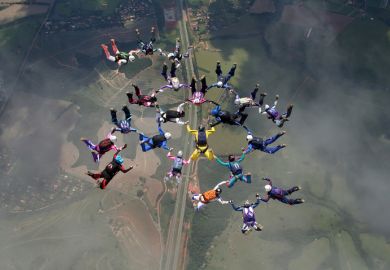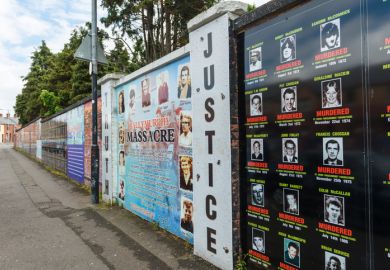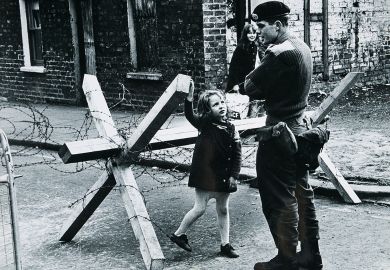David S. Katz
Abraham Horodisch chair for the history of books, Tel Aviv University
I’m writing a book about William James as historian, and since they were very close, I’m duty-bound to read everything by his brother, to my great pleasure. The Library of America recently put out a luxurious but inexpensive hardback edition of the Autobiographies by Henry James, and I look forward to getting an insight into their personal and professional bond. Normally I despise historical films and novels, but having read an early draft for anachronisms and infelicities, on my table is Rachel Kadish’s The Weight of Ink (Houghton Mifflin Harcourt), just published – a superb and wonderfully imaginative reconstruction of the intellectual life of a Jewish woman in London during the time of the Great Plague.
Ronan McDonald
Professor of modern literature, University of New South Wales
In my case, it’s winter reading, as the Sydney eastern beaches endure their annual freeze in July and we curl up by the fire indoors. (OK – it’s not really like that.) Appropriately, then I’ll be turning to Kay Redfield Jamison’s new book Robert Lowell, Setting the River on Fire: A Study of Genius, Mania, and Character (Knopf), a “psychological account” of America’s great post-war poet. Jamison is one of the leading exemplars of that fertile hybrid, the “literary medic”, a professor of psychiatry at Johns Hopkins University and honorary professor of English at the University of St Andrews. She wrote about her own struggle with bipolar disorder in the lauded best-seller An Unquiet Mind. Her new book looks at the tempestuous, ever-restless life of Lowell to source his creativity in his manic depression. My “something old” is John Guillory’s Cultural Capital: The Problem of Literary Canon Formation (University of Chicago Press). The problem of literary and artistic value, its relation to institutionalism and ideology, remains a pressing one for the humanities. Guillory’s intervention was a landmark.
Saikat Majumdar
Professor of English and creative writing, Ashoka University, India
This summer I’m reading, for the first time, an incendiary classic – Allan Bloom’s The Closing of the American Mind (Simon and Schuster). I’m also rereading a recent book: Until the Lions by Karthika Naïr (Arc Publications), an epic poem that retells fragments of the Mahabharata through a medley of strange voices: nameless soldiers, outcast warriors, abducted princesses, tribal queens and a gender-shifting god. For the longest time I had closed my mind against reading Bloom’s book because of its blasted reputation in left-liberal circles as the cursed progenitor of the “culture wars”. Now halfway through it, I’m simultaneously shocked by its ecstatic insularity and intoxicated by its visionary X-ray sweep of American society. It is impossible to believe what maddeningly paradoxical qualities define Bloom’s account of the erotic, social and intellectual lives of late 20th-century American youth – how lyrically incisive and how sadly, at times perhaps wilfully, blindsided. An epic, on the other hand, speaks in many tongues together – and nothing, not even the subversion of its dominant voice, is closed to itself; the rebel voices that slither out in Naïr’s retelling of the Mahabharata, in some ways, were already latent in the original epic, which is more fully realised rather than subverted by the retelling.
Shakira Martin
President, National Union of Students
I don’t often read fiction but Spencer Johnson’s Who Moved My Cheese? (Vermilion) is absolutely my favourite book. It’s about two mice and two little people, sort of. Really it’s about anticipating and adapting to change. What’s so powerful about it is that its message can be applied to any situation. I’ve read it so many times, and every time I’ve taken something new from it. I’ve lived through some ups and some downs, but this book has always felt relevant and inspiring. These are very uncertain times, and I honestly believe that this book can help all of us face the future with hope and a readiness to adapt. At the NUS, I’m bringing change with the start of my presidency, so it feels like the perfect time to be reading this book! My other book is Bev James’ Do It! or Ditch It (Virgin Books), which offers advice on how to plan, prioritise, delegate and take action to get things done. It’s easy to feel overwhelmed by the pace that a lot of us have to work at, and this book promotes the idea that all of us have the ability to be powerful, productive and generally badass.
Emily Michelson
Senior lecturer in history, University of St Andrews
I’m hoping (you heard it here first, folks) to finish writing a book over the next year. This means returning to key texts that inform the whole project. First up is Elisheva Carlebach’s 2001 Divided Souls: Converts from Judaism in Germany, 1500-1750, which sets out fundamental themes for studying religious conversion: the influence of one group on the imagination of another; the shifting balance between public and private; the impossibility of drawing hard or consistent borders; the interplay of universal patterns and local context; the difficulty of shedding one identity and constructing another. Ultimately, these themes apply for studying any interaction between groups. For more summery fare, I’ve headed to Julie Schumacher’s 2014 Dear Committee Members. It’s a send-up of academic life in a middling American university, part of a long tradition of such satires, along with Jane Smiley’s Moo and David Lodge’s Small World. Dear Committee Members is an epistolary novel of frank, biting letters of reference from a jaded creative writing professor. The voluble narrator strays into jeremiads on common academic bugbears, from impenetrable online forms with word limits to rival departments with mysteriously deep pockets. I generally avoid novels about academia, but I’m nodding in amused recognition at every page of this one.

Philip Moriarty
Professor of physics, University of Nottingham
Top of my list of recommended reads for the summer is Tom Nichols’ The Death of Expertise (Oxford University Press). It’s not an especially encouraging or upbeat message – and it certainly won’t put you in a suitably summery frame of mind – but Nichols’ book needs to be read by all academics. Not only is expertise now viewed with suspicion (at best) by many outside academia, but what Nichols argues convincingly is that there’s a steadily growing backlash against formal education itself. Downbeat though it is, I’m hopeful that Nichols’ perceptive analysis will act as a call to arms for academics and experts. I’ll also be revisiting Philip Ball’s wonderfully comprehensive and engaging The Music Instinct: How Music Works and Why We Can’t Do Without It (Bodley Head). There are deep links between music, physics and mathematics that are too often either overlooked or downplayed. Ball’s book complements those links with a thought-provoking overview of some of the psychology underpinning music. The great thing about Ball’s writing is that he admirably doesn’t aim to provide easy answers. A return reading will also help to dispel some of the summertime blues lingering after absorbing Nichols’ analysis of the campaign against established knowledge.
Emilie Murphy
Lecturer in early modern history, University of York
This year marks 500 years since the publication of German reformer Martin Luther’s (pictured inset) Ninety-five Theses , which is widely credited with launching the Protestant Reformation. To mark the anniversary, multiple new scholarly texts have emerged, and of these I am most looking forward to reading Peter Marshall’s weighty reinterpretation of the subject: Heretics and Believers: A History of the English Reformation (Yale). Also this summer, I am going to revisit the late John Bossy’s Christianity in the West, 1400-1700 (Oxford University Press) – a breathtakingly insightful survey that explores the effects of Europe’s religious conflicts on the people (away from institutional histories that had once dominated the topic). Bossy’s sociological approach to the study of religion is as original and inspirational as it was when it was published more than 30 years ago.
Karma Nabulsi
Associate professor in politics and international relations, University of Oxford
In the centenary of the Balfour Declaration, a slew of new books are out on the British colonial project in Palestine: David Cronin’s Balfour’s Shadow: A Century of British Support for Zionism and Israel (Pluto Press), on imperial connections (“Bloody Balfour”, as he was already known in Ireland); Bernard Regan’s The Balfour Declaration: Empire, the Mandate and Resistance in Palestine (Verso), on imperial rivalries, but which also gives voice to the colonised. Still, the remnants of our largely destroyed British imperial records illustrate the obvious: much of Palestinian colonial history remains unknown. This was recently revealed in Ian Cobain’s The History Thieves: Secrets, Lies and the Shaping of a Modern Nation (Portobello). I am particularly looking forward to reading this tale of the 600,000 to 1.2 million secret “migrating files” of Britain’s colonial past at Hanslope Park – a history kept hidden from British schoolchildren. It also demonstrates that British imperial history is yet to be written, given that scholars still lack basic facts. My own inclinations are never to linger with old villains. And James Baldwin is happily back in fashion with a new generation. His Collected Essays (selected by Toni Morrison, Library of America) instantly catches you inside that inimitable cadence, reminding me of why I so admired that restless sensitive spirit when first given them a long time ago.
Barbara Oakley
Professor of engineering, Oakland University
I have an advance copy (lucky me!) of Rob Goodman and Jimmy Soni’s A Mind at Play: How Claude Shannon Invented the Information Age (Simon & Schuster). Shannon was a modern-day Isaac Newton and a slightly less dishevelled version of Albert Einstein. Goodman and Soni’s book is in the tradition of the great biographies by Walter Isaacson. I can hardly wait to dig into it! My second book is Marie Kondo’s The Life-Changing Magic of Tidying Up: The Japanese Art of Decluttering and Organizing (Ten Speed Press). I’ve heard such great things about this book, from so many people, that it’s made me eager to see what all the hullabaloo is about. Besides, maybe it’ll inspire me to clean my office.
Andrew Oswald
Professor of economics and behavioural science, University of Warwick
I am interested in human happiness, both personally and professionally, so I will be reading Carol Graham’s newly published Happiness for All? Unequal Hopes and Lives in Pursuit of the American Dream (Princeton University Press). Dipping into it, one of the intriguing forms of survey data used by Graham is on verbal measures of optimism. These data reveal that wealthy people use words that reflect knowledge acquisition and healthy behaviours, while the poor use words that reflect a short-term mental outlook and palpable desperation. Inequality, and its deep forces, can thus be sensed from language itself. My second holiday book will be different. It is one I first read in the early 1990s. It is the Haynes Service and Repair Manual for Saab 9000 motor cars between the years 1985 and 1998. If you have not driven an original Saab 9000 2.3 Aero, I am afraid you just don’t understand the concept of the pursuit of happiness.

Tamson Pietsch
Senior lecturer in social and political sciences, University of Technology Sydney
While academics in the northern hemisphere are packing their books and heading for the beach or the hills, south of the equator we are curling up by the fire. Keeping me company there will be Karl Polanyi’s The Great Transformation, a book that has been so frequently cited in my reading of other people’s work this year that I’ve decided it’s high time I had a direct encounter. I am also looking forward to taking up the late, great Terry Pratchett’s (pictured) Making Money (Corgi). I have always loved his Discworld books for the wry, affectionate, incisive commentary on our world they offered, and I thought I had made my way through them all. Imagine my joy, then, when I came upon this one in a second-hand book stall last week!
Davina Quinlivan
Senior lecturer in performance and screen studies, Kingston University
Since I’ll be spending a week in Southwold, Suffolk, a stone’s throw away from Anna Freud’s pink cottage in Walberswick, it seems particularly apt to be taking along with me a copy of her Selected Writings (Penguin) on child psychoanalysis and female adolescence. I’ll be reading Freud’s work in preparation for an autumn talk at the Freud Museum on girlhood in film, folk horror, hysteria and, above all, witches! In addition to Freud, I’ll be revisiting bell hooks’ Reel to Real: Race, Sex and Class at the Movies (Routledge). Her hugely inspiring, incisive exploration of cinematic representation and patriarchal culture in films such as Spike Lee’s She’s Gotta Have It or Quentin Tarantino’s oeuvre is as vital as it was when it was first published nearly a decade ago. I don’t like to think of Reel to Real as a “seminal textbook”; it’s a compassionate and deeply personal response to film, to the politics of visual culture and its history in the making of meaning in the 20th century.
Barry Reay
Professor of history, University of Auckland
One of my reads in your summer – but my winter – will be Queer, edited by David Getsy in the excellent Documents of Contemporary Art series (Whitechapel Gallery). It was out last year, but I have only just procured a copy, which I am sure will be useful for my research and teaching on the history of sex. My classic will be Last Exit to Brooklyn (1957), Hubert Selby Jr’s powerful, sometimes shocking, evocation of a lost sexual world inhabited by what were once termed “fairies”: “It is so refreshing to meet a man who will give you a good fucking.” I read Last Exit when writing my book New York Hustlers, but I am keen to revisit it to explore characters who might now be described as trans. However, I will be doing my reading in front of the fire rather than by the pool or on the beach.
Jennifer Schnellmann
Associate professor of pharmacology, University of Arizona
For the summer, I have two books lined up that have nothing in common with what I must read for work. This will be a welcome departure to pleasure reading for sure. First, I have chosen Mark Manson’s The Subtle Art of Not Giving a F*ck: A Counterintuitive Approach to Leading a Good Life (HarperOne). As a “professional worrier”, I anticipate that this book will show me new approaches for reducing my perpetual insomnia caused by cataloguing everything that could go wrong the next day. My next choice will be Being Mortal by Atul Gawande (Profile), a surgeon and writer who writes beautifully about the honest failures of medicine/physicians. Hopefully, both books will allow me to focus more on what matters and less on the insignificant.
Jessica Seeliger
Assistant professor of pharmacological sciences, Stony Brook University
I am a Johnny-come-lately to microbiology, and so Paul de Kruif’s swashbuckling narrative Microbe Hunters (Houghton Mifflin) was as much a textbook as a history book to me when I started in the field. His florid style is decidedly out of fashion in non-fiction and refreshingly so. Describing the tuberculosis bacterium, which I study, de Kruif writes, “They were…finicky about their food and feeble in size, but more savage than hordes of Huns and more murderous than ten thousand nests of rattlesnakes”. Whatever bone you might pick with his metaphors, he captures scientific truths about this pathogen and others in a way that no research paper can. I will return to be reinspired by the incredible insights our scientific forebears achieved about these deadly bugs and, from my now more experienced viewpoint, to compare his view of modern knowledge to ours 90 years later. For the more conventional choice, I will turn to Jeanette Winterson (if you can call her conventional) and her take on The Winter’s Tale, The Gap of Time (Vintage). Both of my reads are retellings – one scientific, one Shakespearean. As with any dramatic performance, half the fun is in disagreeing with the interpretation and, in the process of articulating your indignation, arriving at a new understanding of your own.
Lynne Segal
Anniversary professor of psychology and gender studies, Birkbeck, University of London
Never more disdained than in the profit-obsessed, welfare-dismantling tidal waves of recent decades, caring work is rarely the most glamorous of topics – least alluring when involving the needs of the chronically ill or disabled. Yet I sense a shift. Suddenly I am hearing that our value system is inverted and absurd. We have been hugely expanding and rewarding the most pointless of jobs, derided even by many performing them, while ignoring, squeezing out, always underpaying, those providing the essential labours of care. Enough of all that! said the most popular performer at the Glastonbury Festival, Labour leader Jeremy Corbyn, on 24 June. This is why I’m packing in my suitcase the latest slim text by Julia Segal, The Trouble with Illness: How Illness and Disability Affect Relationships (Jessica Kingsley). Segal (no relation!) uses her lifetime’s work to enlighten us on how those involved in care work, or just wanting to know more about it, could help to meet one of the most urgent challenges of the moment – helping to transform the world of those with chronic illness or disability, whatever our own age or medical condition. Relatedly, I’ll be rereading Sheila Rowbotham’s Dreamers of a New Day (Verso), reminding us of the urgent need to “reinvent utopia in every era”.
Dominic Shellard
Vice-chancellor, De Montfort University
While on our #DMUglobal trip to Berlin in early June, I led a visit to the Sachsenhausen concentration camp with a group of our students. The gas chamber, Gestapo prison, death strip, Jewish camp and shoe-testing track (where prisoners were forced to walk for days to see if the latest footwear for the German Army was durable enough) were intensely distressing to witness. But what struck me with truly implacable force was a recognition of the meticulous effort and planning required – Sachsenhausen was the camp that controlled all the others – to be so sadistically cruel and murderous. I have, therefore, decided to read Saul Friedländer’s much praised Pulitzer prizewinning account of the Holocaust, The Years of Extermination (HarperCollins), to try to contextualise what I have recently seen.
Receiving a gold ranking in the teaching excellence framework will open an exciting new range of opportunities for De Montfort, so I will also be undertaking my annual re-engagement with the work of leadership guru John Kotter. He writes with clarity and verve about the potential and challenges of change and I always find him inspiring.

Peter J. Smith
Reader in Renaissance literature, Nottingham Trent University
Fifty years after the decriminalisation of male homosexuality in the UK, with Queer British Art, 1861-1967 at Tate Britain and Angels in America at the National Theatre (both shows are terrific), seems like a good time to revisit gay studies. Greg Woods’ Homintern: How Gay Culture Liberated the Modern World (Yale University Press) is an exhilarating place to start. The title is a mischievous corruption of Lenin’s Communist International, or Comintern, and refers to “a joke, a nightmare, or a dream, depending on one’s point of view” – a ubiquitous network of homosexuals at the heart of literature, ballet, theatre, music, Hollywood and so on. Woods is a knowing and witty stylist; of the concept of “discretion”, for instance, he writes: “It is a broader concept than the ‘closet’, but it occupies some of the same wardrobe space”. My summer classic will be Dante’s The Divine Comedy but in a new translation by Clive James (Picador). His two recent short collections, Sentenced to Life and Injury Time, with their breathtaking pathos and poetic rigour, anticipate the epic’s formal control and its emotional intensity.
Andrew Thompson
Chief executive, Arts and Humanities Research Council
I’m planning to read two biographies: David Macey’s Frantz Fanon (Verso) and Jeremy Lewis’ richly detailed study of David Astor (Vintage). Together they provide contrasting perspectives on the end of empire. Martinique-born Fanon (1925-61) trained as a psychiatrist in Lyons before taking up a post in colonial Algeria. He became a supporter of and propagandist for the Algerian liberation movement – the Front de Libération Nationale – and a leading anti-colonialist writer and theorist. The liberal-minded Astor (1912-2001), whose life was blighted by depression, championed decolonisation in Africa. He was the foremost newspaper editor of his generation and much more interested in foreign than domestic matters. He transformed The Observer into a newspaper admired for the quality of its writers, especially on African affairs. He was a strong supporter of anti-apartheid efforts and helped to set up Amnesty International. I’m rereading Macey, an extraordinarily humane and insightful study. Lewis I haven’t yet read, but I am full of anticipation as he writes lucidly and with a deep understanding of his subject.
David Wheeler
Chairman, International Higher Education Group
Ever loyal to the burgeoning literary talent in my adopted home of Canada, I shall be reading Suzette Mayr’s Dr Edith Vane and the Hares of Crawley Hall (Coach House Books). This gothic and magical novel draws on numerous awful but true stories that the author has gleaned from academic colleagues across the globe and projects them on to the hapless life of her eponymous heroine. Dr Vane – “100% a loser”, according to Mayr – is a professor of English literature living the dream, toiling in a dehumanising and toxic fictional university somewhere in western Canada. Given how close that is to home on multiple levels, I shall also revisit David Lodge’s campus trilogy Changing Places: A Tale of Two Campuses, Small World: An Academic Romance and Nice Work (Penguin) for a reminder of more innocent days before neoliberalism arrived to diminish our professional pride and creative application of academic freedom, if not (hopefully) our collective sense of humour.
David Willetts
Visiting professor, King’s College London
The new book I will be reading over the summer is Jonathan Taplin’s Move Fast and Break Things: How Facebook, Google, and Amazon Have Cornered Culture and What It Means for All of Us (Macmillan). It is the latest in a growing tide of critiques of the West Coast digital monopolies. They don’t just have massive commercial power: their revenues as the dominant platforms come at the expense of the content providers – the artists and writers. How has this happened and what can we do about it? I hope Taplin’s book offers some clues. This summer I may at last get to grips with a classic that I have not been able to face before – Milton’s Paradise Lost. Now John Carey has brought out a new (shorter) edition (Faber) with a clearer sense of the argument behind it, which might just make it accessible to the rest of us. I look forward to giving it a go.
Edward Wilson-Lee
Fellow and director of studies in English, Sidney Sussex College, University of Cambridge
I’m looking forward to finishing the first draft of my current book and reading some things only tangentially related to my research: Charlie English’s The Book Smugglers of Timbuktu: The Quest for this Storied City and the Race to Save Its Treasures (William Collins), which combines deserts and libraries, two of my great loves, and David Beckingham’s The Licensed City: Regulating Drink in Liverpool, 1830-1920 (Liverpool University Press), a ground-breaking study of how alcohol-licensing practices have shaped (and continue to shape) our urban communities. I will also be reading Chandrasekhar Kambar’s 1975 novel-cum-mythography-of-colonialism, Karimayi, in the new translation by Krishna Manavalli (Seagull Books).
Duncan Wu
Professor of English, Georgetown University
We love poets with a curse on them. The pseudo-religion of art demands that we see the gift of inspiration as a transaction, the terms of which reward genius with madness. Kay Redfield Jamison’s Robert Lowell, Setting the River on Fire: A Study of Genius, Mania, and Character (Alfred A. Knopf) refracts the myth through the poet’s history of manic depression. A cruel story it may be, but these are the ones that most engage us. “Je demande que vous m’assassiniez ” shrieked Jacques-Louis David in defence of Marat. There was madness in David’s politics, and that may partly explain why he remains such a compelling figure. He was also a great artist, capable of capturing the iridescent play of light on creased satin with hallucinatory clarity. In David’s portrait in the National Gallery, Washington DC, Napoleon Bonaparte gazes at the viewer with an intensity verging on the radioactive. This summer I look forward to catching up with Anita Brookner’s Jacques-Louis David (Thames and Hudson), the biography of a neoclassical master by one of the most subtle thinkers and finest prose stylists of her time.
Sabrina Zirkel
Dean of education and counselling psychology, Santa Clara University
This summer, I am looking forward to reading Viet Thanh Nguyen’s Nothing Ever Dies: Vietnam and the Memory of War (Harvard University Press): “All wars are fought twice, the first time on the battlefield, the second time in memory.” I loved the author’s fictional account of a Vietnamese double agent, The Sympathizer, which won the Pulitzer Prize for Fiction in 2016. It was a brilliant story of torn allegiance and the challenge of being able to see both sides. Any academic who can write both strong scholarly work and national prize-winning fiction is a hero to me. I’ll also be finally getting around to Amitav Ghosh’s Flood of Fire (John Murray), the third in his fictional Ibis trilogy chronicling the opium trade and human trafficking in and between 19th-century India, China, Mauritius and England. I guess colonialism, migration and refugees are on my mind.
Read part one of our 2017 summer reads
Register to continue
Why register?
- Registration is free and only takes a moment
- Once registered, you can read 3 articles a month
- Sign up for our newsletter
Subscribe
Or subscribe for unlimited access to:
- Unlimited access to news, views, insights & reviews
- Digital editions
- Digital access to THE’s university and college rankings analysis
Already registered or a current subscriber? Login







